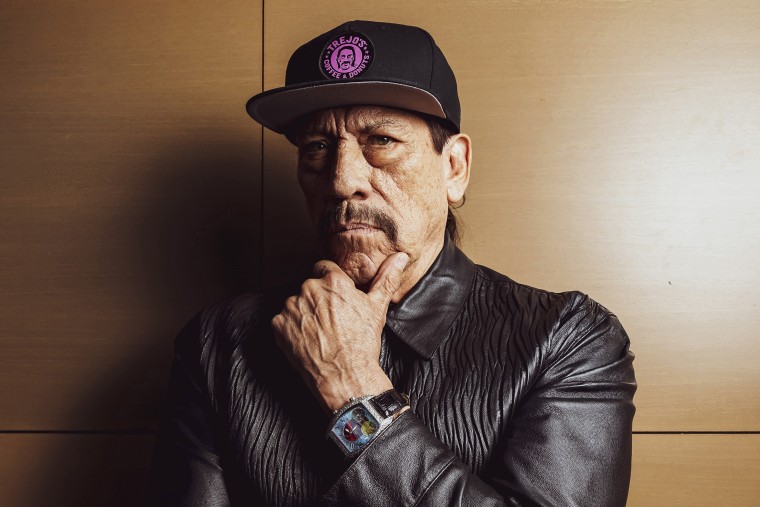At age 7, Danny Trejo did his first drug deal. At 12, he was using heroin. In tenth grade, he stabbed a boy in the face with a broken wine bottle. He was kicked out of at least five high schools before he entered the California penal system. He spent most of the 1960s doing time at some of the state’s most notorious prisons, including Folsom, Soledad and San Quentin.
Then Trejo got sober, got out of prison and went on to appear in hundreds of movies and TV shows, including “Spy Kids,” “Machete,” and “Breaking Bad.” He became an entrepreneur as well, with a string of successful restaurants. How Trejo transformed his life is the subject of his new memoir, written with fellow actor Donal Logue,“Trejo: My Life of Crime, Redemption, and Hollywood.”
“Trejo” has been well received, with Publishers Weekly calling it “powerful and expertly crafted,” and Kirkus Reviews terming it “a raw and deeply engrossing salvation story.” Currently on a virtual book tour, Trejo has survived everything from childhood abuse to cancer to a prison encounter with Charles Manson.
For Trejo, 77, revisiting the dark chapters of his life was an emotional experience. “Those memories are very, very painful," Trejo told NBC News. "Thinking and talking about some of them brought tears to my eyes, but the purging of them and seeing them on paper was really redeeming.”
Trejo was born into a Mexican American family that he said was defined by its “toxic masculinity” and “destructive machismo.” Several of his uncles, nephews and cousins did time behind bars. “This was what it meant to be a Trejo man,” he writes. “What it was to live up to the Trejo name.”
From cellblock to Hollywood lot
For Trejo, the turning point came in 1968, when he was in solitary confinement at Soledad and potentially facing the death penalty. “I made a deal with God. I asked Him to let me die with dignity,” Trejo said. “Then I promised to always say His name and help my fellow inmates.” He didn’t even use the term “my fellow man,” Trejo recalled, because he assumed that he would be spending the rest of his life behind bars.
At that moment, Trejo writes, “In that cell God killed the old me, made a new Danny Trejo, and said, ‘Now let’s see what you do with him.'”
In a twist of fate, the charges against Trejo were dropped and he was released from prison. Newly sober, he began working as a recovery counselor and rebuilding his life. Yet it wasn’t easy. Trejo was so accustomed to prison that life inside felt more normal than life as a free man. “Every type of lockup was home for me.”
In 1985, while seeking out an acquaintance who needed help with sobriety, Trejo visited the set of the movie, “Runaway Train.” There he was spotted by a director and given a role in the film. This was the beginning of Trejo’s new career, which often consisted of playing “Inmate 1” on TV and in films.
Over time, Trejo became one of the world’s most recognizable character actors, in movies like “Desperado," “Heat” and “Blood In, Blood Out.” In the latter film, a crime drama, Trejo returned to San Quentin as an actor — and actually filmed scenes inside his old cell.
Trejo said that, at one point in his career, he wondered if he was being hired for his acting ability or because of his background as a convict. But he realized that he had always been acting, especially in prison, when he had assumed various personas to survive.
“Back then, I was the Mexican you didn’t want to f--- with,” he writes in the book. He was also the same person who acted out scenes from “The Wizard of Oz” and sang “Zip-A-Dee-Doo-Dah" in solitary confinement to keep from going crazy.
“Everybody has done a movie with Danny Trejo. He is like the new Kevin Bacon,” said actress Patricia Rae, who appeared with Trejo in the film “North by El Norte.” She described him as “humble, very into causes, and very much a humanitarian.”
“He (Trejo) is down-to-earth,” Rae said. “When you talk to him, he is not a name-dropper, unlike many people in the business. And as an actor, he is super available and present.”
In 2015, Trejo branched out from the entertainment industry and opened Trejo’s Tacos and Trejo’s Coffee and Donuts in Los Angeles.
Trejo’s co-writer, Logue, has been friends with Trejo for 30 years. "Although Danny has told his story many times, I think we were able to go much deeper with this book," Logue said. "He dealt with the specter of his childhood traumas and discovered things he had compartmentalized and put away.”
In his memoir, Trejo confronts the cycle of addiction and violence that has engulfed his family for generations. On the day Trejo met President Barack Obama in 2013, Trejo’s son was homeless and on drugs.
“What is interesting to me is Danny’s dichotomy,” Logue said. “He can be that hard guy in movies, he can act in a terrifying way. But he has tremendous spiritual equanimity as well, and he is always helping people.”
To this day, Trejo still works as a recovery counselor and has made headlines for real-life acts of heroism and philanthropy, like donating food to front-line workers and families in East L.A. during the pandemic. Last year, the city of Los Angeles honored him for his community service by declaring Jan. 31, “Danny Trejo Day.”
Trejo hopes that people see his life as proof that it is always possible to change. “I was so blessed. I made a deal with God, and I honestly have lived up to my end of the deal. I say His name every day, and I try to help people, whether they are homeless or people getting out of prison, and that’s how I live my life.”
Follow NBC Latino on Facebook, Twitter and Instagram.

